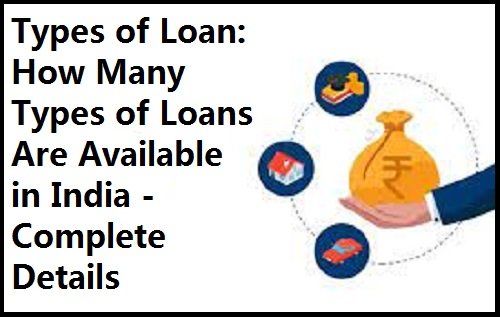
Types of Loan -: Now people are taking loans indiscriminately for every work in the country. Earlier you had to go to the bank and take a loan, today this process has become so easy that now you can take a loan just from your phone.
Loan meaning debt is a word which in earlier times people wanted to avoid. In olden times, people considered taking loan against their honour. Even those people who used to work by taking loans had less respect in the society.
But today’s times have changed completely 360 degrees. An old saying ‘drinking ghee after taking a loan’ is absolutely true in today’s times. In the world of show-off, nowadays people are buying things less on the basis of need and more for show-off. Now whether their pocket is ready for this or not.
The banks caught hold of this compulsion of the people or should we say this weakness and gave loans to the customers at very easy and cheap installments. Now the trend of ‘No Cost EMI’ has also increased rapidly in the country. The habit of taking things on loan has become so prevalent in the country that now banks have started giving you loan for everything. Amidst so many loans, you may also be confused as to how many types of loans are there in the country. Today we are going to give you the answer to this very thing.
Types of Loan
Home Loan
Every person dreams of his own house. Some people complete it on their own and some people complete it by taking loans from banks. Its meaning is clear from its name itself. Home loan is taken by the lender to buy or construct a house.
Home loan interest rates start between 7 percent per annum to 7.5 percent per annum. You can repay the loan in equated monthly installments (EMI). The loan-to-value (LTV) ratio is typically 80 percent. This means, the borrower can avail a loan only up to 80 percent of the property value.
Gold Loan
Gold loan is taken against the gold owned by the lender. Here, the gold acts as a security for the lender allowing the borrower to pledge the gold with the lender and receive money from them. Gold loan interest rate starts from 7.50 percent per annum. LTV on gold loan can go up to 90 percent.
Vehicle Loan
These are loans taken for the purchase of a vehicle. Vehicles can include both passenger and commercial vehicles as well as two-wheelers, four-wheelers and heavy vehicles.
Interest rates on vehicle loans can start anywhere between 7 percent per annum to 7.5 percent per annum. LTV depends on the type of vehicle. For some vehicle loans, the bank may also offer a loan up to 100 percent of the value of the vehicle.
Loan Against Property
It is a type of mortgage loan, through which the borrower can obtain money by mortgaging his property with the lender. Loan against property can be taken against both residential and commercial property.
The LTV in this loan can be anywhere between 65 percent to 70 percent. The interest rate here starts from 8 percent per annum.
Loan Against Securities
Investors often invest in shares and securities. This may include shares, mutual funds, bonds and debentures. Investors are eligible to borrow money from banks and financial institutions against these securities.
LTV for loans against securities is 50 per cent of the security value. This can start anywhere between 7.50 per cent per annum.
Loan Against FD
Banks and financial institutions provide loans to creditors against FDs. Borrowers can avail loan against FD for an amount ranging from 60 per cent to 75 per cent of the FD value. FD rates range between 5 per cent to 7.5 per cent per annum depending on the amount and tenure.
Loan Against Insurance
Loan against insurance is also one of the popular secured loans in India. Many people have life insurance policies, but little do they know that the policies can act as security against which money can be borrowed.
Also Read – Latest News
In case of insured loans the LTV can be anywhere between 85 per cent to 90 per cent per annum. In this case the interest rate can start anywhere between 10 percent per annum to 12 percent per annum.
Working Capital Loan
Working capital loans are given by banks and financial institutions to help businesses meet their working capital needs.
This loan is also known as cash credit, here the amount of loan that can be availed depends on the creditors, debtors and the stock that constitutes the working capital for the business. The interest rate on working capital loan can start from 12 percent per annum.
Personal Loan
These are one of the most sought after bank loans in India. Personal loans are loans given by banks or financial institutions without any security.
The borrower can use the borrowed amount for any purpose, be it medical emergency, marriage, children’s education, buying a property or travelling.
The amount of personal loan a borrower can avail depends on the income of the borrower and his CIBIL score. Moreover, the interest rates on personal loans can range from 8 percent per annum to 10 percent per annum.
Short Term Business Loans – Types of Loan
Uncertainty can arise in business at any time. If a business is facing financial crisis, it can go for short term business loans.
Interest rates for short-term business loans can range anywhere between 1 percent and 1.5 percent per month.
Education Loan
If one wants to get quality education, one has to spend lakhs of rupees. Education loan provides monetary assistance in such cases.
Interest rates on education loans can start from 8.85 percent per annum, with repayment of the education loan usually starting 12 months after completion of education.
LATEST POSTS – Types of Loan
- Homemade Veg Pizza Recipe | Veggie Pizza Recipe: “घर पर बनाएं स्वादिष्ट वेज पिज़्ज़ा: आसान और मज़ेदार रेसिपी”
- Jodhpur News 26 July 2024: जाने जोधपुर में आज सोने, चांदी, पेट्रोल और डीजल की कीमतों के भाव के साथ जोधपुर की ताजा खबर
- SBI Vacancy 2024 – SBI में नौकरी पाने का शानदार अवसर, नहीं देनी होगी लिखित परीक्षा, 85000 से अधिक है मंथली सैलरी
- Lemon Rice Recipe (Tangy Flavorful Rice): “टैंगी फ्लेवर के साथ बनाएं यह खास लेमन राइस”
- Jodhpur News 25 July 2024: जाने जोधपुर में आज सोने, चांदी, पेट्रोल और डीजल की कीमतों के भाव के साथ जोधपुर की ताजा खबर
